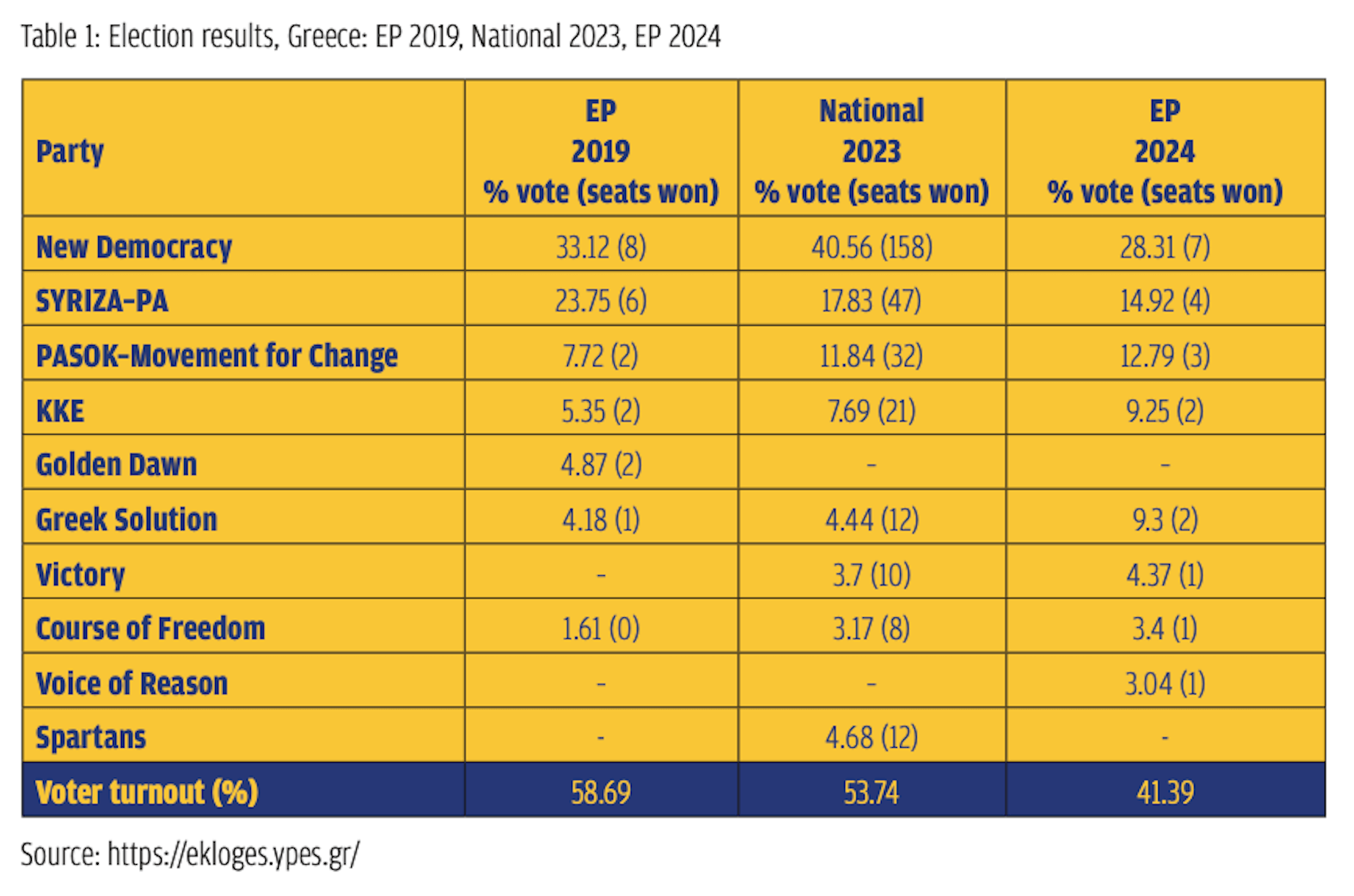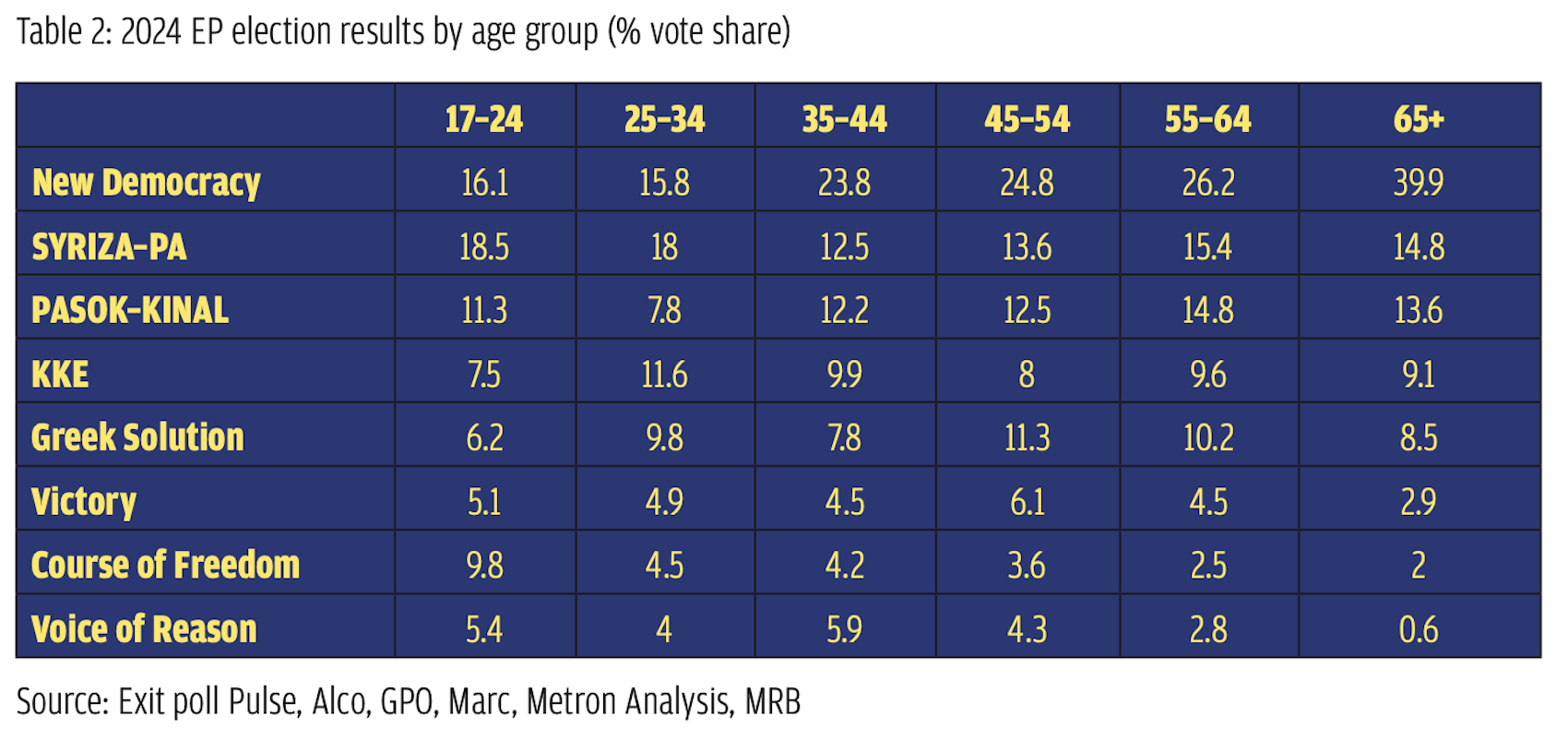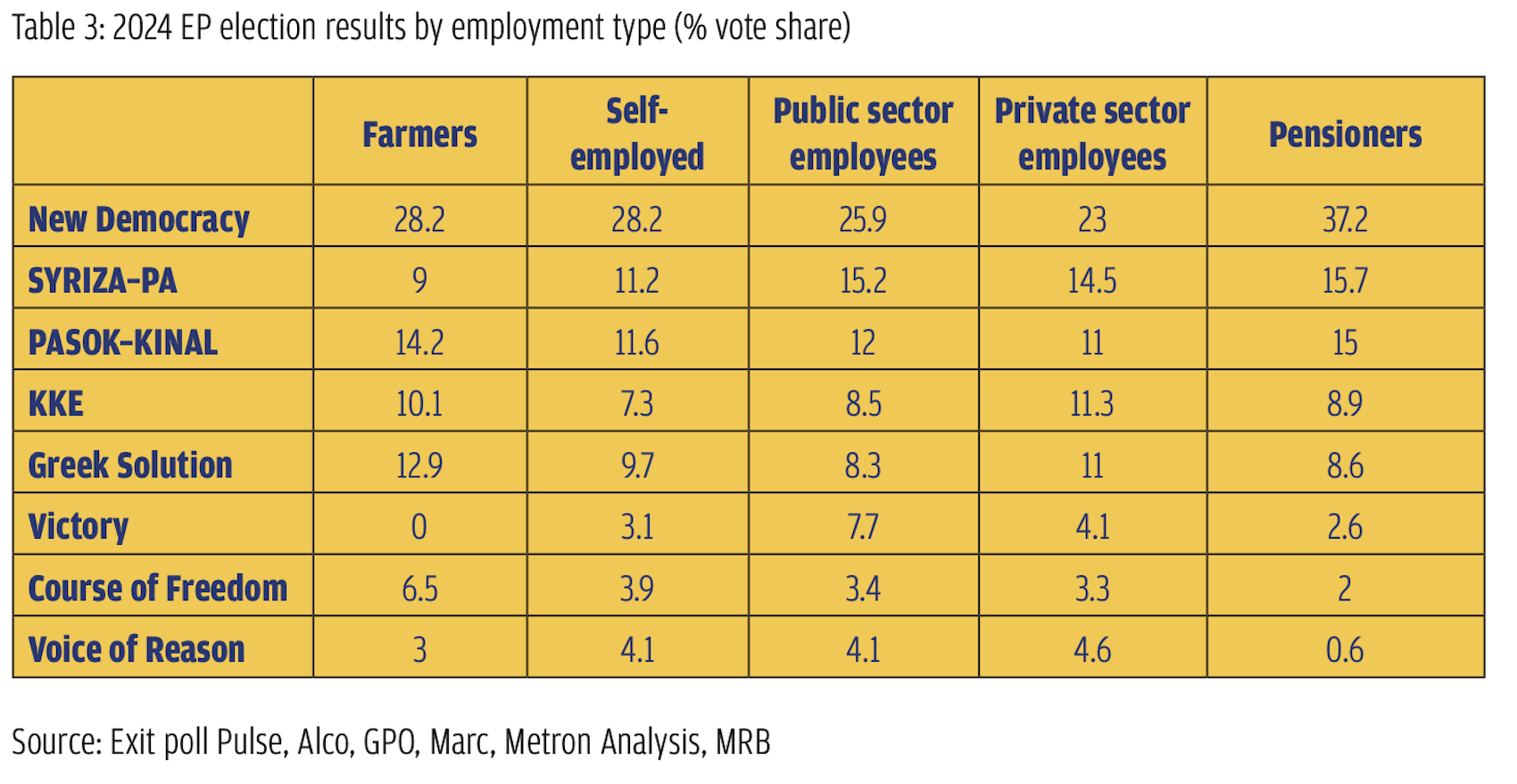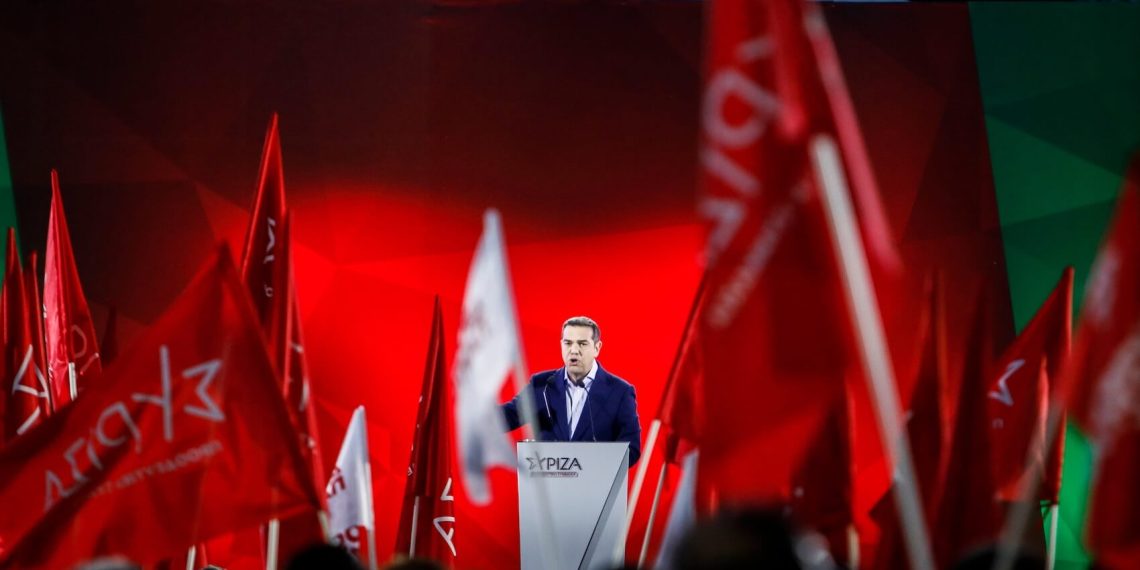Please cite as:
Vasilopoulou, Sofia. (2024). “Economic Malaise and Political Discontent: An Analysis of the 2024 European Parliament Election in Greece.” In: 2024 EP Elections under the Shadow of Rising Populism. (eds). Gilles Ivaldi and Emilia Zankina. European Center for Populism Studies (ECPS. October 22, 2024. https://doi.org/10.55271/rp0072
DOWNLOAD REPORT ON GREECE
Abstract
The 2024 European Parliament (EP) election in Greece was held against a background of geopolitical instability in Europe’s neighbourhood. However, domestic – rather than European – issues dominated the campaigns, including the economy, inflation and the cost-of-living crisis. The electoral results were primarily an anti-government protest vote and confirmed a trend of electoral fragmentation across the political spectrum. On the right, three relatively new far-right populist parties received parliamentary representation, i.e., the Greek Solution, Victory and the Voice of Reason. On the left, SYRIZA–PA maintained its second place, although its support declined substantively compared to the previous EP election. Course of Freedom and the KKE, on the other hand, were key electoral beneficiaries in the left-wing space. Younger age groups primarily opted for SYRIZA–PA, whereas older groups were more likely to support New Democracy. That said, far-right parties also received votes from younger generations. Geographically, the far right is more successful in the north of Greece. The key message of this election was political discontent and a general feeling of economic malaise posing dilemmas across the political spectrum.
Keywords: elections; public opinion; populism; the left; the right; Greece
By Sofia Vasilopoulou* (King’s College London)
Introduction
Greeks went to the polls on Sunday, 9 June 2024, to elect 21 Members of the European Parliament (MEPs). Although a total of 31 parties competed for Greek citizens’ votes, only eight received enough votes to reach the 3% electoral threshold for parliamentary representation. The elections were held against a background of geopolitical instability with the war in Ukraine and the conflict in Gaza. Yet, domestic questions, such as the economy, inflation and the cost-of-living crisis, influenced the vote.
The electoral results confirmed a trend of electoral fragmentation on both the left and right ends of the politicalspectrum despite the centre-right New Democracy retaining first place. On the right, three far-right parties with populist agendas, including Greek Solution, Victory and Voice of Reason, elected four MEPs in total. The substantive policies of these parties share several similarities, and their narratives are all based on a similar populist logic. However, their 2024 EP election campaigns prioritized different issues. Whereas Greek Solution talked more about its economic agenda and the cost-of-living crisis, Victory focused on religion and family, and Voice of Reason placed emphasis on Islam and the so-called ‘woke culture’.
On the left, the Coalition of the Radical Left–Progressive Alliance (SYRIZA–PA) came second with approximately 15% of the vote, translating into four EP seats. The Communist Party of Greece (KKE) and the Course of Freedom secured two and one seats, respectively. These parties vary substantively in their policies. SYRIZA–PA put forward a centre-left agenda, Course of Freedom continued its anti-establishment rhetoric, and KKE maintained its communist agenda.
In what follows, I first analyse the policies of Greek populist parties on domestic and international issues. I then proceed to examine the electoral results, offering a glimpse into some socio-demographic and geographic patterns of the vote. I will finally conclude with some thoughts about the dilemmas presented to parties following the electoral results.
The ‘supply-side’ of Greek populism in the 2024 EP election
Greece has been characterized as a populist democracy (Pappas, 2014), in which populism tends to be observed across the party system and is expressed through blame-shifting and exclusivist narratives (Vasilopoulou et al., 2014). Greek populism cuts across the left–right dimension and is generally concentrated among the political parties that reject the mainstream politics of the ‘old two-party system’ associated with the Panhellenic Socialist Movement (PASOK) and New Democracy (Tsatsanis et al., 2018). Based on this distinction, this section discusses the ideologies and positions of six populist parties in Greece in the run-up to the 2024 EP election in Greece.
Right-wing populism
Greek Solution (Ελληνική Λύση) – EP group: European Conservatives and Reformists
The far-right populist Greek Solution was founded in 2016 by Kyriakos Velopoulos, a former member of the far-right Popular Orthodox Rally (Λαϊκός Ορθόδοξος Συναγερμός) and the centre-right New Democracy (Νέα Δημοκρατία).
The party rose to prominence amid Greek protests against the Prespa Agreement signed between Greece and North Macedonia to settle an enduring dispute between the two nations. During that time, other far-right parties in Greece were experiencing electoral decline, which favoured Greek Solution. For example, members of the Golden Dawn (Χρυσή Αυγή), an extreme right-wing party (Vasilopoulou & Halikiopoulou, 2015) were being indicted for running a criminal organization, and the Independent Greeks (Ανεξάρτητοι Έλληνες) had lost credibility among their voters for participating in an electoral coalition with the left-wing SYRIZA (Συνασπισμός της Ριζοσπαστικής Αριστεράς).
Greek Solution has a prominent anti-establishment narrative glorifying the ‘pure’ Greek people against the ‘evil’ and ‘corrupt’ Greek political elites. Its populist message is combined with an ethnonationalist rhetoric, which is said to derive its strength from ‘Hellenism’. The party’s core beliefs may be summarized by its focus on ‘Greece, religion, family’. During the 2024 EP election campaign, the party leader professed to ‘make Greece and Greeks proud again’, arguing that Greek Solution has ‘clean hands and clean ideas’ (Greek Solution, 2024a).
On the cultural dimension, Greek Solution is critical of immigration, and what it calls ‘the language of rights’ and ‘imposed’ multiculturalism (Greek Solution, 2024b). It is pro-Russian (Dimitropoulos 2022; Wondreys, 2023) and against compulsory vaccinations (in.gr, 2021). While not openly calling for a Greek exit from the European Union (EU), Greek Solution has a vision for a Europe of nation-states extending from Lisbon to Siberia that is Christian and includes Russia, i.e., what the party calls a ‘European Europe’ that gives veto power to all member states (Greek Solution, 2024c). Despite its Eurosceptic position, the leader of Greek Solution argued that EP elections are very important because nine out of ten decisions made in the Greek Parliament derive from EU legislation and that, therefore, abstention would mean support for the national government (Greek Solution, 2024d).
On the economic dimension, the party offers a somewhat blurred policy combination of low taxation mixed with economic intervention and welfare chauvinism (Georgiadou & Mavropoulou, 2022). The party’s EP election campaign primarily focused on the ‘cost-of-living crisis’ framed with a robust anti-establishment narrative. For example, they castigated the government, declaring that ‘Greeks are hungry and poor, but politicians are rich’. In its pre-electoral campaign, the party also focused on the expressed needs and priorities of the primary economic sector, specifically agriculture. Its economic plan consisted of reducing food production costs to support farmers by removing fuel duty, flat taxes and investment in mining to subsidize free schemes for energy self-sufficiency across Greece. Interestingly, and contrary to the cultural model of far-right voting behaviour (Norris & Inglehart, 2019), Greek Solution’s party leader attributes the rise of far-right parties to economic reasons, such as poverty, unemployment and the cost-of-living crisis (Greek Solution, 2024b).
Democratic Patriotic Movement–Victory (Δημοκρατικό Πατριωτικό Κίνημα–Νίκη) – EP group: Non-Attached
The far-right Victory was founded in 2019, shortly after the signing of the Prespa Agreement, which, it argues, has been a betrayal to the Greek people considering that there is only ‘one’ Macedonia, which is ‘only Greek’ (Victory, 2024). The party first competed in the 2023 general election and gained ten seats. It puts forward an ultra-conservative religious narrative premised on an ethnic conception of Greek national identity and a belief in the primacy of the church over the state.
Victory makes populist appeals differentiating between the ‘good’ Greek people (who are equated to the Greek nation) and the elites presented as ‘gangs’ that place their partisan interests over the ‘sacred’ national interest (Victory, 2024). The party rejects left–right ideology, suggests that parties have colluded against the Greek people and the Greek nation, and promises to ‘free’ Greece from these partisan interests. It calls for binding referendums on important questions, the removal of the electoral threshold, and the reduction of the size of the Greek Parliament from 350 to 200 deputies.
On the cultural dimension, the party opposes liberal values, is against minority rights, and talks about Greece’s ‘spiritual, biological and territorial self-destruction’ (Victory, 2020). Its ideology is premised on a strong belief in the Orthodox Christian religious tradition. The party is careful to avoid criticisms that it strategically employs religion in its discourse and argues that ‘We do not have a religion, we have faith’. Victory is firmly against LGBTQ+ rights and abortion, arguing that ‘nature is law’, and proposes to establish a ‘Ministry of National Demographic Growth’ that would ‘ensure the biological future of the Greek nation in our ancestral land’ (Victory, 2020b) and address issues related to family, childbirth, immigration and repatriation. To that end, the party promises birth subsidies, benefits for stay-at-home mothers with two or more children, and tax reductions for families. The party is prone to conspiracy theories, for example, arguing that LGBTQ+ Pride events are supported and subsidized by the US embassy, George Soros and international lobbies (Victory, 2024b). It is also against vaccinations (Newsbeast, 2023).
Victory’s position towards the EU is rather blurry. The party appears to support a Greek exit from the EU so the country is ‘free from its guardians’, but it does not openly advocate for it. It suggests that Greece needs to focus first on being socially and economically stronger and praises the Visegrad countries (Poland, the Czech Republic, Slovakia, and Hungary) for promoting their national interests within the EU (Victory, 2020c). It is noticeable, however, that the EU was not a salient issue in the party’s 2024 European manifesto, which focuses primarily on domestic issues, including measures to support family, population growth, cheap energy and rural communities. Victory is pro-Russian and criticizes Greece’s support for Ukraine in the ongoing conflict.
The party has a staunch anti-globalization agenda, supports strategic investment in agriculture and Greek self-sufficiency in food and energy. While it supports low taxation for both businesses and households, it proposes tax increases on banks and multinational corporations as well as on money transfers to other countries.
Voice of Reason (Φωνή Λογικής) – EP group: Patriots for Europe
Voice of Reason is a relatively new far-right party founded in 2023 by Afroditi Latinopoulou, a former New Democracy candidate. The party describes itself as a contemporary patriotic movement that serves Greek identity and values, such as ‘Homeland, religion, family.’ Like Greek Solution and Victory, it portrays Greece in decline and seeks to appeal to the ‘ordinary Greek’ against the corrupt establishment. The party is against ‘political correctness’ and portrays itself as being censored from Greek media (Latinopoulou, 2024). Interestingly, although the party does not have any known links to the Spartans or the Golden Dawn, Latinopoulou criticized as anti-democratic the decision of the Greek Supreme Court to ban the Spartans from running in the 2024 EP election on suspicion they were being led by Ilias Kasidiaris, a former Golden Dawn member of the Greek Parliament currently serving a prison sentence for directing a criminal organization (Newsbreak, 2024).
The ideology of Voice of Reason draws inspiration from the so-called ‘Great Replacement’ theory. It argues that globalization, atheism, Muslim immigration and a rights discourse are replacing Greek culture and Christianity. It maintains that ‘Brussels’ is a pro-globalization entity whose decisions support global financial interests. The leader claims that she is in favour of a ‘Europe of nations, not a Europe of illegal immigrants and rights’ activists’ (Danikas, 2024). According to the party, migration policy and the so-called ‘woke culture’ were at stake in the 2024 EP election (Voice of Reason, 2024). The party warns about the ‘Islamization of Greece and Europe’. Its policy solutions consist of the deportation of illegal immigrants, the closing of Greek borders, and the relocation of reception centres for migrants outside Greece. The party is staunchly against the acceptance of non-heterosexual sexual orientations, same-sex marriage and adoption rights. It prioritizes demographic growth through measures that support the ‘Greek’ family.
Left-wing populism
Coalition of the Radical Left–Progressive Alliance (Συνασπισμός της Ριζοσπαστικής Αριστεράς – Προοδευτική Συμμαχία, SYRIZA–PA) – EP group: The Left
SYRIZA has been the main opposition party in Greece since 2019. The party was founded in 2004 and remained at the margins of the Greek party system until it rose to power during the Greek crisis. SYRIZA is a radical left populist party that critiques international capitalism and attempts to provide a socially just alternative to it. It is socially progressive, committed to equality and rights, and has historically put forward a version of soft Euroscepticism, criticizing the EU’s democratic deficit. During the Greek crisis, it adopted a fervent populist rhetoric blaming domestic and international elites for the Greek crisis (Vasilopoulou et al., 2014). It embraced an anti-establishment protest strategy, arguing that a different – anti-neoliberal – path was possible to take Greeks out of poverty and social exclusion.
After SYRIZA-PA’s defeat in the 2023 national election, the party elected a new leader, Stefanos Kasselakis, a relatively unknown politician and a former banker. Kasselakis was elected on a ticket prioritizing transparency, justice, labour rights, progressive taxation, and LGBTQ+ rights. The transformation of the party following its new leadership remains to be seen, especially considering that it has led to ongoing debates and factional splits within the party. During the 2024 EP election campaign, the party refrained from strong anti-neoliberal rhetoric and instead talked about a ‘progressive’ political space. The party had a positive message asking Greeks to opt for SYRIZA-PA at the ballot box: ‘For a better life, now’. Instead of an anti-establishment agenda, SYRIZA-PA talked about social protection, security and opportunities for all.
Course of Freedom (Πλεύση Ελευθερίας) – EP group: Non-attached
Course of Freedom is an anti-establishment political party founded in 2016 by former President of the Greek Parliament and SYRIZA MP Zoe Konstantopoulou. Its policy proposals are mixed, making it difficult to firmly place the party on the left–right spectrum. The leader explicitly argues: ‘We look neither right nor left. We look forward’ (CNN, 2024).
On the cultural dimension, the party puts forward an equality and inclusion agenda that tolerates differences and supports human, minority and LGBTQ+ rights (Course of Freedom, 2024b). It supports same-sex marriage and is pro-Palestinian (Chatzikonstantinou, 2024). At the same time, the party adopts a strong sovereigntist narrative seeking to appeal to ‘popular conscience’ with emotive language. For example, it demands reparations from Germany for the Second World War and seeks to ‘shake off the yoke of the memorandum despotism, the totalitarianism of the Eurobureaucracy, the debtocracy, the bankocracy and the interests and oligarchies that support, feed and benefit from this anti-democratic regime’ (Course of Freedom, 2024a). Course of Freedom has also been critical of the Prespa Agreement, appealing to nationalist voters opposed to austerity.
Communist Party of Greece (Κομμουνιστικό Κόμμα Ελλάδας, KKE) – EP group: Non-attached
The KKE was founded in 1918 and is considered an orthodox communist party guided by the ‘revolutionary worldview of Marxism–Leninism’ (KKE, 2013). It is among the few parties in Europe with such an ideological agenda that has maintained a persistent level of electoral success. In line with its communist ideology, the party rejects ‘bourgeois democracy’ and seeks to overthrow capitalism.
The KKE employs populism in its discourse (Hawkins et al., 2020). It has an anti-elite rhetoric arguing that Greek mainstream parties ‘blackmail the people’ and that New Democracy should be ‘afraid of the people’ (902.gr, 2024). On the cultural dimension, whereas KKE is tolerant of immigration, it is fervently against the decriminalization of drug use and exhibits culturally conservative attitudes towards LGBTQ+ rights, including same-sex marriage and adoption (Naftemporiki, 2024).
The party has a hard Eurosceptic stance, supporting Greece’s exit from the EU. It views the EU as imperialistic, anti-democratic, capitalist and exploitative. It perceives the EU’s impact on national sovereignty to be adverse and an impediment to social justice. In his pre-electoral speech, the party leader called the workers and the people to use their vote in order to ‘raise a red flag against the EU, SYRIZA and PASOK’, arguing that these parties satisfy the wishes of their ‘exploiters’ under the ‘delusion’ of social democracy (902.gr, 2024).
The KKE is also anti-American, anti-NATO and anti-EU. It is pro-Palestinian yet views the war in Ukraine as an imperialistic conflict between the ‘bourgeois powers’, i.e., the EU, NATO and the US, and ‘capitalist Russia’ (KKE, 2023). Economically, it proposes the nationalization of all industries and a centrally planned economy.
The campaign context
The 2024 EP election occurred against the backdrop of public dissatisfaction with domestic politics. Based on a Pew Research Centre (2024) opinion poll conducted between January and March 2024, 53 % of Greek respondents reported an unfavourable view towards the EU, which was 3 percentage points higher compared to 2023 and the largest group across the European countries surveyed. The same poll reported that in Greece, in contrast to other EU member states, public Euroscepticism derives primarily from left-leaning citizens. In addition, satisfaction with democracy had dropped from 32 % in 2021 to 22 % in 2024 (Pew Research Centre, 2024b) and was – not for the first time – the lowest across the sample of European countries. It is therefore no surprise that citizen dissatisfaction with the government was prominent among the public. For example, only 35% of respondents thought that their vote in the EP election would change things in Greece, 48% saw it as an opportunity to express protest (Alco, 2024), and 60% as a chance to vote against the government (To Vima, 2024).
Although public interest in the EP election was relatively high at 56% (Alco, 2024), national issues dominated the campaigns and were core to citizens’ decision-making. When presented with a list of issues that would influence their vote in the 2024 EP elections, 53.4 % of respondents answered the cost-of-living crisis and the economy. Other issues included European issues (8.2%), security (7.8%), health (7.6%), foreign policy (6.9%), the Tempi train crash (a deadly head-on collision between two trains in the Thessaly region in 2023) (6.5%), education (2.9%) and same-sex marriage (2.9%) (To Vima, 2024). These responses reflected a feeling of general economic malaise. For example, according to a Metron Analysis survey conducted in May 2024, the top two most important issues facing the country included the cost-of-living crisis (40%) and the economy (27%) (Kathimerini, 2024a). Most parties also devoted their campaigns to national issues. Although there was no official pre-electoral TV debate, on 24 May 2024, there was an informal debate in the Greek Parliament during its last session prior to the EP election, where questions of inflation and the cost-of-living crisis also dominated.
Interestingly, according to the Youth and Democracy Eurobarometer (2024) survey, the top priority for young Greeks is fighting poverty and economic and social inequalities (45%, 9 percentage points above the EU average). This is followed by preserving peace, reinforcing international security and promoting international cooperation (35%), and promoting human rights, democracy and common European values (31%).
Electoral results
Confirming the ‘second-order’ character of EP elections, only 41.39% of the electorate turned out to vote (table 1). Although this followed a general trend of declining turnout (Vasilopoulou & Halikiopoulou, 2012), turnout was particularly low in 2024, i.e., over 12 percentage points lower than the 2023 national election and over 17 percentage points lower than the 2019 EP election.
Prior to the election, New Democracy and SYRIZA-PA had set themselves specific goals. On the one hand, the leader of New Democracy claimed that he was aiming for the same electoral result as in 2019 (Reporter, 2024). On the other hand, SYRIZA-PA’s Kasselakis claimed that he would be satisfied if his party gained over 20% of the vote (EFSYN, 2024). Both leaders’ claims failed to materialize, as the electoral result was overall one of electoral fragmentation both on the right and the left.
On the left, SYRIZA-PA’s electoral result dropped compared to the previous national and EP elections to just under 15%. The KKE received 9.25% of the vote, translating into two MEPs. Lastly, Course of Freedom received 3.4% of the vote, remaining relatively stable compared to the 2023 national election. On the right, three political parties received parliamentary representation, including Greek Solution with 9.3 %, Victory with 4.37 % and Voice of Reason with 3.04%. Together these parties elected 4 out of 21 MEPs.

The socio-demographics of the vote
There were no clear socio-demographic patterns of support for populist parties as defined by age and employment (Tables 2 and 3). Based on the exit poll (Kathimerini, 2024b), younger age groups primarily opted for SYRIZA–PA, whereas older groups were much more likely to support New Democracy. Course of Freedom benefited electorally from the youngest 17–24 age group. Young Greeks also opted for the far right going against the perception that these parties’ strongholds are among the older generations. In fact, older people voted primarily for New Democracy. Whereas Greek Solution received the least votes from the 17–24 age group, Voice of Reason received its second-best outcome in the same group. In addition, Greek Solution was the third most preferred party among the 25–34 age group.
In terms of employment status, SYRIZA–PA attracted support from public and private sector employees as well as pensioners. KKE was mostly successful among private sector employees and farmers. On the right, Greek Solution received significant support from farmers, which is consistent with the party’s strategy to add to its ballot a female farmer from the north of Greece, Galato Alexandraki, who was elected as an MEP. Farmers, nonetheless, were quite fragmented in their political preferences also supporting the left-wing populist Course of Freedom. Pensioners were much less likely to opt for Greek Solution, Victory or Voice of Freedom. Victory was very successful among public sector employees, whereas private sector employees were the top group for Voice of Reason.

 There is also an interesting geographic dimension to the far-right populist vote (for a European perspective, see also Ejrnæs et al., 2024). In many districts in Northern Greece, these parties received above-average results. Specifically, Greek Solution came second in six electoral districts of the north, including Imathia (18.42%), Pella (17.28%), Kilkis (16.54%), Thessaloniki B (15.82%), Serres (15.64%), and Drama (15.52%).
There is also an interesting geographic dimension to the far-right populist vote (for a European perspective, see also Ejrnæs et al., 2024). In many districts in Northern Greece, these parties received above-average results. Specifically, Greek Solution came second in six electoral districts of the north, including Imathia (18.42%), Pella (17.28%), Kilkis (16.54%), Thessaloniki B (15.82%), Serres (15.64%), and Drama (15.52%).
Conclusion
The key message of this election is political discontent and a general feeling of economic malaise. Citizen protest against the government and domestic issues, such as inflation, the economy and the cost-of-living crisis, dominated the 2024 EP election in Greece. The results confirmed a trend of fragmentation across the political spectrum, which poses dilemmas both on the right and the left. On the right, the strength of the populist far right limits the electoral potential of a centrist strategy for the centre-right New Democracy. If New Democracy were to move towards the centre, multiple contenders would likely contest for the political space to its right. At the same time the far right is also divided, and it is not clear whether these parties are willing to work together. On the left, there is a discussion on the possibility of SYRIZA–PA joining forces in order to be able to challenge New Democracy. This strategy is also not without complexity: for SYRIZA–PA, it might entail that the party fully loses its radical and populist appeal, whereas PASOK might be seen as disloyal towards its core voters.
(*) Sofia Vasilopoulou (PhD LSE) is Professor of European Politics at King’s College London, UK. Her research and teaching interests lie in Comparative Politics, Political Behaviour, Party Politics and European Union Politics. Her work examines the causes and consequences of political dissatisfaction among the public and the ways in which this is channelled through party strategies and party competition. Specific themes include Euroscepticism and far-right politics. She has published articles in leading international peer-reviewed journals, including the European Journal of Political Research, Political Behavior, European Union Politics, the Journal of Common Market Studies, the Journal of European Public Policy and West European Politics. She is the author of Far-Right Parties and Euroscepticism: Patterns of Opposition (ECPR Press and Rowman & Littlefield 2018) and The Golden Dawn’s Nationalist Solution: Explaining the Rise of the Far Right in Greece (Palgrave Macmillan 2015 with Daphne Halikiopoulou). She is Joint Editor in Chief of the European Journal of Political Research.
References
902.gr (2024, May 22) Ομιλία του Δ. Κουτσούμπα σε συγκέντρωση στο Περιστέρι (LIVE) https://www.902.gr/eidisi/politiki/364936/omilia-toy-d-koytsoympa-se-sygkentrosi-sto-peristeri-live
Alco (2024). Ερευνα APLHA 2–6 Ιουνίου. Alcopolls. http://alcopolls.gr/portfolio/%CE%B5%CF%81%CE%B5%CF%85%CE%BD%CE%B1-aplha-2-6-%CE%B9%CE%BF%CF%85%CE%BD%CE%B9%CE%BF%CF%85
Chatzikonstantinou, M. (2024, May 23) Αναγνώριση του παλαιστινιακού κράτους και από την Ελλάδα ζητά η αντιπολίτευσηhttps://www.naftemporiki.gr/politics/1669023/anagnorisi-toy-palaistiniakoy-kratoys-kai-apo-tin-ellada-zita-i-antipoliteysi/
CNN (2024, May 23) «Θέλεις Ζωή και στην Ευρωβουλή;»: Το σποτ της Κωνσταντοπούλου για τις ευρωεκλογέςhttps://www.cnn.gr/politiki/story/420745/theleis-zoi-kai-stin-evrovouli-to-spot-tis-konstantopoylou-gia-tis-evroekloges
Course of Freedom (2024a) Ιδρυτική Διακήρυξη https://www.plefsieleftherias.gr/idrytiki-diakiryxi/
Course of Freedom (2024b, June 17) Post on X. https://x.com/pl_eleftherias/status/1802612195508769248
Danikas, D. (2024, May 20) Αφροδίτη Λατινοπούλου στον Δανίκα: «Εγώ είμαι με τη Μελόνι και τη Λεπέν που είναι κεντροδεξιές» https://www.protothema.gr/politics/article/1499187/afroditi-latinopoulou-ston-danika-ego-eimai-me-ti-meloni-kai-ti-lepen-pou-einai-kedrodexies/
Dimitropoulos, G. (2022, February 24) Ελληνική Λύση: Τι λέει για την εισβολή της Ρωσίας στην Ουκρανίαhttps://www.flash.gr/elliniki-lysi-ti-leei-gia-tin-eisvoli-tis-rosias-stin-oukrania-842357
EFSYN (2024). Κασσελάκης: Θα είμαι ικανοποιημένος με ποσοστό πάνω από 20%. Efsyn.https://www.efsyn.gr/politiki/antipoliteysi/433749_kasselakis-tha-eimai-ikanopoiimenos-me-pososto-pano-apo-20
Ejrnæs, A., Jensen, M. D., Schraff, D., & Vasilopoulou, S. (2024). Introduction: Regional inequality and political discontent in Europe. Journal of European Public Policy, 31(6), 1465–1493. https://doi.org/10.1080/13501763.2024.2333850
Eurobarometer (2024). Youth and Democracy. Europa. https://europa.eu/eurobarometer/surveys/detail/3181
Georgiadou, V., Mavropoulou, J. (2022). Greek Solution, Populism in Europe – a comparative study of nine populist parties. Athens: Friedrich-Ebert-Stiftung. https://athens.fes.de/projekte/populism-in-europe
Greek Solution (2024a) Προεκλογικό σποτ της Ελληνικής Λύσης – Ευρωεκλογές 2024 https://elliniki-lisi.gr/proeklogiko-spot-ellinikis-lysis-efroekloges-2024-2
Greek Solution (2024b) Το πρώτο δεκάλεπτο σποτ της Ελληνικής Λύσης για τις Ευρωεκλογές 2024 https://elliniki-lisi.gr/to-proto-dekalepto-spot-tis-ellinikis-lysis-gia-tis-efroekloges-2024
Greek Solution (2024c) Δεκάλεπτο σποτ της Ελληνικής Λύσης για τις Ευρωεκλογές 2024 https://elliniki-lisi.gr/dekalepto-spot-tis-ellinikis-lysis-gia-tis-evroekloges-2024
Greek Solution (2024d) Σαρανταπεντάλεπτο σποτ της Ελληνικής Λύσης για τις Ευρωεκλογές 2024 https://elliniki-lisi.gr/to-sarantapentalepto-tis-ellinikis-lysis-evroekloges-2024
Hawkins, K. A., Rovira Kaltwasser, C., & Andreadis, I. (2020). The Activation of Populist Attitudes. Government and Opposition, 55(2), 283–307. doi:10.1017/gov.2018.23
In.gr (2021, July 1) Ο Βελόπουλος που πουλούσε αλοιφές για τον κοροναϊό, ζητά τα πιστοποιητικά εμβολιασμού των βουλευτών https://www.in.gr/2021/07/01/politics/paraskinio/o-velopoulos-pou-poulouse-aloifes-gia-ton-koronaio-zita-ta-pistopoiitika-emvoliasmou-ton-vouleyton/#google_vignette
Kathimerini (2024a). Δημοσκόπηση: 4 κόμματα στη μάχη του 3% – Τα 5 σημαντικότερα προβλήματα για τους πολίτες. Kathimerini. https://www.kathimerini.gr/politics/563047735/dimoskopisi-4-kommata-sti-machi-toy-3-ta-5-simantikotera-provlimata-gia-toys-polites/?utm_source=piano&utm_medium=email&utm_campaign=editors_pick&pnespid=D7Is70cC7HoDk1uM5pzfF0Ubrhkiyblztw9AHKRYI4HKP03HW5.wxqL1jbnlOmyh_c5VeSvEaw
Kathimerini (2024b). Ευρωεκλογές 2024: Η ακτινογραφία της κάλπης της Κυριακής.
Kathimerini. https://www.kathimerini.gr/politics/563073946/eyroekloges-2024-i-aktinografia-tis-kalpis-tis-kyriakis/
KKE (2013) Το Πρόγραμμα του ΚΚΕ https://www.kke.gr/arxes-stoxoi/programma/
KKE (2023, March 27) On the one year since the imperialist war in Ukraine https://inter.kke.gr/en/articles/ON-THE-ONE-YEAR-SINCE-THE-IMPERIALIST-WAR-IN-UKRAINE/
Latinopoulou, A. (2024, June 4) Post on X https://x.com/latinopoulou/status/1798019604637417943
Naftemporiki (2024, January 29) ΚΚΕ: Γιατί λέμε όχι στον γάμο των ομόφυλων ζευγαριών – Αναλυτικά το σκεπτικόhttps://www.naftemporiki.gr/politics/1578537/kke-giati-leme-ochi-ston-gamo-ton-omofylon-zeygarion-analytika-to-skeptiko/
Newsbeast (2023, November 27) «Να σταματήσει η παραπλανητική προπαγάνδα κατά του εμβολιασμού για την Covid-19» λέει η υφυπουργός Υγείας Ειρήνη Αγαπηδάκη https://www.newsbeast.gr/politiki/arthro/10263186/na-stamatisei-i-paraplanitiki-propaganda-kata-tou-emvoliasmou-gia-tin-covid-19-leei-i-yfypourgos-ygeias-eirini-agapidaki
Newsbreak (2024, April 25) Η Αφροδίτη Λατινοπούλου για το «μπλόκο» στους «Σπαρτιάτες» στις Ευρωεκλογέςhttps://www.newsbreak.gr/politiki/589036/i-afroditi-latinopoyloy-gia-ton-mploko-stoys-spartiates-stis-eyroekloges/
Norris, P., & Inglehart, R. (2019). Cultural backlash: Trump, Brexit, and authoritarian populism (1st ed.). Cambridge University Press. https://doi.org/10.1017/9781108595841
Pappas, T.S. (2014). ‘Populist Democracies: Post-Authoritarian Greece and Post-Communist Hungary’, Government and Opposition, 49(1), 1–23. doi:10.1017/gov.2013.21.
Pew Research Centre (2024a). Ratings of the EU remain broadly positive in member countries, but have gone down slightly since 2022. Pew Research Centre. https://www.pewresearch.org/short-reads/2024/06/03/ratings-of-the-eu-remain-broadly-positive-in-member-countries-but-have-gone-down-slightly-since-2022/
Pew Research Centre (2024b). Satisfaction with democracy has declined in recent years in high-income nations. Pew Research Centre. https://www.pewresearch.org/short-reads/2024/06/18/satisfaction-with-democracy-has-declined-in-recent-years-in-high-income-nations/
Reporter (2024). Γιατί έβαλε ο Μητσοτάκης το όριο της επιτυχίας στο 33%; Reporter.https://www.reporter.gr/Apopseis/Anemodeikths/602265-Giati-ebale-o-Mhtsotakhs-to-orio-ths-epitychias-sto-33
To Vima (2024). Δημοσκόπηση GPO: Η ακρίβεια, η αντιπολίτευση του «κανένα» και τα φαβορί για την Ευρωβουλή. To Vima. https://www.tovima.gr/2024/05/30/politics/dimoskopisi-gpo-i-akriveia-i-antipoliteysi-tou-kanena-kai-ta-favori-gia-tin-eyrovouli/
Tsatsanis, E., Andreadis, I., & Teperoglou, E. (2018). Populism from Below: Socio-economic and Ideological Correlates of Mass Attitudes in Greece. South European Society and Politics, 23(4), 429–450. https://doi.org/10.1080/13608746.2018.1510635
Vasilopoulou, Sofia & Daphne Halikiopoulou (2013). In the Shadow of Grexit: The Greek Election of 17 June 2012, South European Society and Politics, 18(4), 523–542, DOI:10.1080/13608746.2013.779784
Vasilopoulou, S., & Halikiopoulou, D. (2015). The Golden Dawn’s nationalist solution: Explaining the rise of the far right in Greece. Palgrave.
Vasilopoulou, S., Halikiopoulou, D. and Exadaktylos, T. (2014). Greece in crisis: Austerity, Populism and the Politics of Blame. Journal of Common Market Studies, 52: 388–402. https://doi.org/10.1111/jcms.12093
Victory (2020a, September 2) Πολιτική Διακήρυξη https://nikh.gr/i-niki
Victory (2020b) Εθνικό Ολοκληρωμένο Πρόγραμμα για το Δημογραφικό https://nikh.gr/theseis/dimografiko/2-ethniko-olokliromeno-programma-gia-to-dimografiko
Victory (2020c, September 4) Ευρωπαϊκή Ένωση και Ευρώ https://nikh.gr/theseis/oikonomia/2-evropaiki-enosi-kai-evro
Victory (2024a) Ευρωεκλογές 2024 https://nikh.gr/euroekloges2024
Victory (2024b, June 2015) Victory post on X https://x.com/nikhgreece/status/1802109732531913130
Voice of Reason (2024) Letter of the leader https://fonilogikis.gr/
Wondreys, J. (2023). Putin’s puppets in the West? The far right’s reaction to the 2022 Russian (re)invasion of Ukraine. Party Politics, 0(0). https://doi.org/10.1177/13540688231210502


